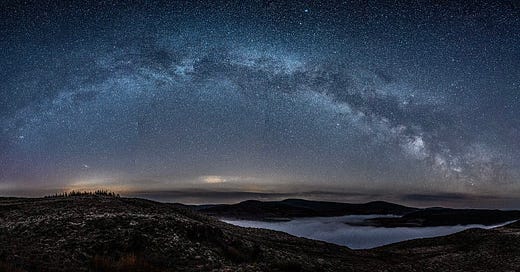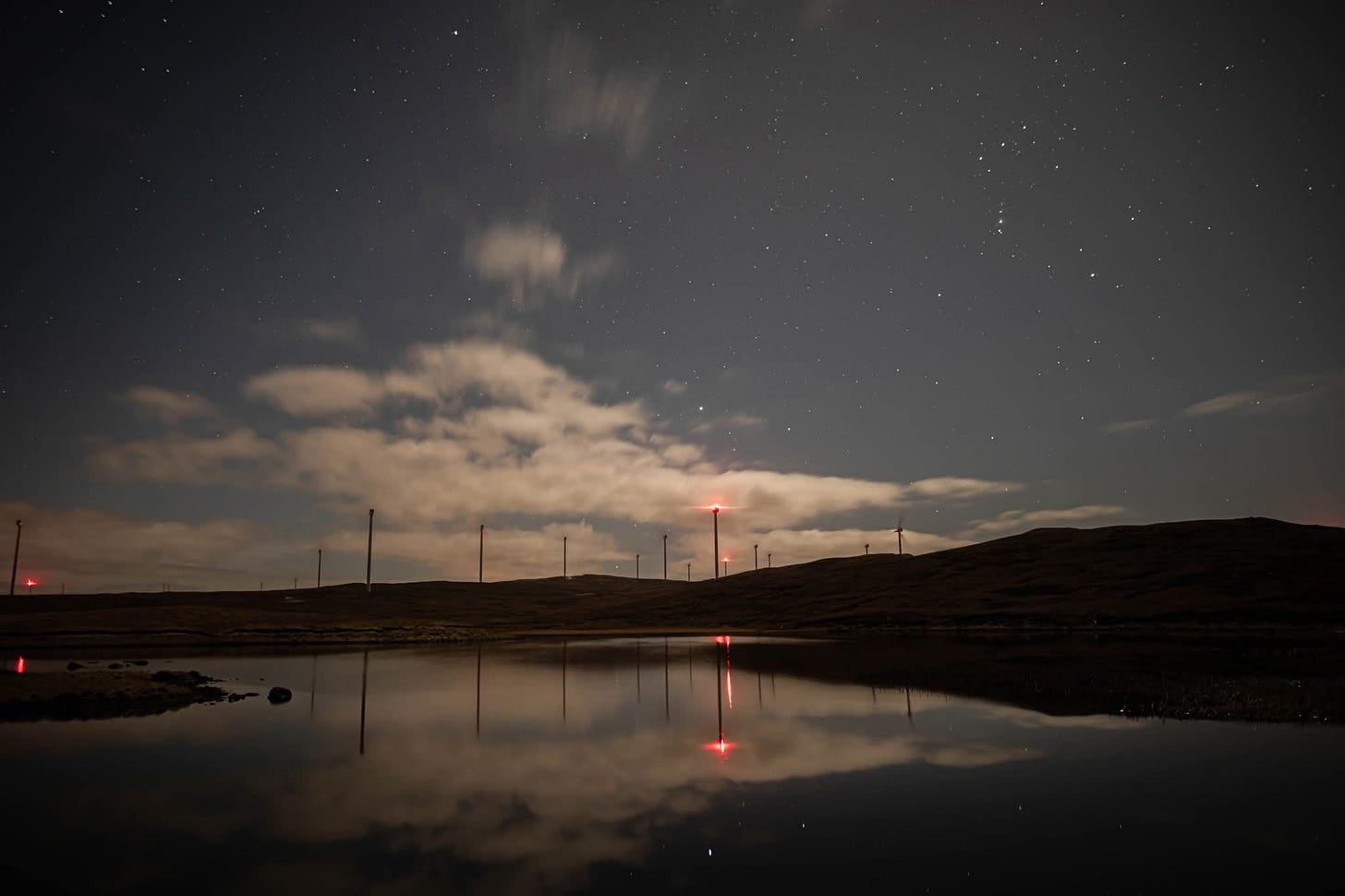Wales' Dark Sky Reserves
DarkSky International congratulates Wales on its leadership in dark sky conservation
Wales is one of the world’s premier destinations for stargazing. Astrotourism has become a buzzword in modern travel, attracting skilled and amateur astronomers keen to experience the starry heavens and celestial events in our pristine skies here.
How does that relate to the Welsh Government's encouragement of foreign investors to install vast numbers of turbines in our rural landscapes? We have over 700 wind turbines in the planning system. All of them over 150m tall.
Last week, Nation Cymru published this news item: “Wales leads the UK in dark skies protection”
It was a press release for the Welsh Government’s ‘Good Practice Guidance: Planning for the Conservation and Enhancement of Dark Skies’, which features a foreword written by Rebecca Evans, Cabinet Secretary for Economy, Energy and Planning for the Welsh Government.
Structures over 150m require aviation lighting. The Civil Aviation Authority’s policy statement1 for onshore wind turbines requires aviation lights to be fitted to illuminate in all directions without interruption.
Rebecca Evans is the minister who has approved six wind farms since she took office last September.
In her foreword to the good practice guidance, she writes;
“Our connections to the night sky are ancient and Wales is incredibly fortunate to have the highest percentage of protected dark skies in the world. When star gazing, I am always struck by the awesomeness of the night sky and how it creates a tangible connection to generations past who observed and experienced the same sky.”
The planning guidance tells us that “Artificial Light At Night (ALAN) impacts the biodiversity and functioning of whole ecosystems, and therefore it is important to mitigate impacts on the most important sites (e.g. SSSIs) and the functional networks that support and connect them.”
How do they plan to mitigate the obvious disadvantages of aviation lighting on onshore turbines?
How do they plan to mitigate the less obvious disadvantages of light pollution on ecosystems outlined in the planning guidance?
What do we stand to lose if they can’t achieve it?
Alyn takes 4 minutes to introduce this video. What follows is 5 minutes of glorious dark sky photography that speaks for itself. Do watch to the end and enjoy!
Do you have an opinion on this?






Well done Annie!
I want to congratulate you on all of the brilliant work you have been doing to highlight the utter crassness of the Welsh Government's zealous drive to make Wales a 'renewable energy superpower'.
Your clear, accurate and logical approach to delivering factual information, coupled with wonderful imagery, leaves no doubt as to what future generations are set to lose if the WG continue to get their way.
The WG, - and I include both Labour and Plaid under the umbrella term of 'Welsh Government' - , have been developing their renewables policies over many years and have shrouded them in a massive web of contradictory and, arguably, duplicitous verbal diarrhoea in order to make it appear that they are 'caring' about what happens to the environment, whilst at the same time, they have been methodically working towards opening up the whole of Wales to large renewables industry businesses, who are intent on doing nothing more than making money out of stripping the land of precious, irreplaceable, non-renewable natural resources.
The WG have at no time given any proper consideration for, or placed any recognisable value on what those natural resources might actually be and have consistently ignored the voices of concerned locals, wildlife organisations and even scientific facts, choosing, instead, to dance to the tune piped out by their cohort of renewables 'stakeholders' and 'partners'.
As a result, they have become totally dismissive, even rudely derogatory, of those who dare to be in opposition and, to add insult to injury, they have gone about it all in a way that is entirely undemocratic.
Gerald Durrell, talking about conservation in the early 1960s, said 'By and large, people are apathetic because they do not realise what is going on, but the most dangerous part of the problem is political apathy, because it is not only at top level that you can get things done. Most politicians would not risk their careers for the sake of conservation, because firstly they do not think it is important, and secondly, they treat conservationists with the disregard they would display towards an elderly spinster's ravings over her pet peke. But, unlike us, animals have no control over their future. They cannot ask for home rule, they cannot worry their MPs with their grievances, they cannot even get their unions to agree to strike for better conditions. Their future and their very existence depends on us'.
Gerald also said, when protesting about proposals to drill for oil on the Great Barrier Reef some decades ago, that 'The average Australian........appears to be badly served by his politicians, who display an astonishing ignorance on any subject that is not immediately connected with sheep, opals, minerals or anything else that can make them a quick buck......The problem the conservationist has is a difficult one; it is how to educate the politicians, for by and large, they are like retarded children'.
Sadly, it appears that nothing has changed.
It is still, 'Business as usual'.